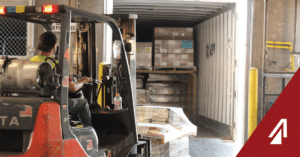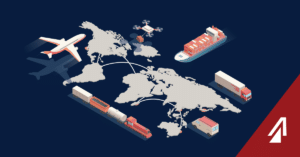The Third-Party Logistics (3PL) industry has undergone a remarkable evolution, tracing its roots from the early days of logistics facilitation to its present state of strategic integration. Initially conceived to handle specific logistics functions like warehousing and transportation, 3PLs have transformed into indispensable partners that shape the efficiency and adaptability of supply chains. The industry’s journey reflects a shift from transactional services to a more holistic approach, embracing cutting-edge technologies, data-driven planning, and continuous improvement measures. This metamorphosis positions 3PLs as pivotal contributors to the dynamic, interconnected world of modern supply chain management.
ProTrans International stands at the forefront of this transformation, offering comprehensive solutions to streamline cross-border and customs processes, minimize risks, reduce transportation spend, and optimize supply chains. They offer integrated logistics services domestically and internationally, leveraging global partnerships and infrastructure to deliver flexible service options.
Reducing Spend through Optimization and Consolidation
Logistics providers are instrumental in helping businesses expand their operations and navigate complex challenges within the supply chain. One of their key strengths is the ability to adjust logistics capacity in response to fluctuating market demands and seasonal variations. Harnessing advanced technologies and data analysis, they also excel in optimizing routes tailored to each customer’s specific requirements. Through optimization techniques, they can minimize the number of truckloads, resulting in reduced fuel consumption and increased overall supply chain efficiency.
ProTrans, a leading consolidation provider in North America, stands out in the logistics industry with a well-established network and particular expertise in cross-border services. In addition to route optimization, their consolidation model allows them to combine shipments from multiple customers into a single trailer, maximizing utilization and enabling customers to pay only for the space they use. This approach ensures efficient transportation while minimizing overall transportation spend. This commitment to cost-effectiveness is part of their dedication to being a partner and global 3PL.
Data-Driven Planning for Efficiency
Companies are recognizing the importance of integrating technology solutions into their operations, increasingly adopting transportation management systems (TMS), warehouse management systems (WMS), and real-time tracking platforms. These technologies play a vital role in streamlining operations, improving visibility, and facilitating better decision-making, ultimately resulting in cost savings for their customers. Logistics providers also leverage advanced forecasting techniques and data analytics to accurately predict demand patterns, enabling customers to adjust their operations accordingly. This enhances efficiency and improves inventory management.
What sets ProTrans apart is its strong emphasis on data-driven planning throughout every step of the supply chain. They meticulously analyze historical customer data and trends, enabling them to make proactive decisions that significantly enhance efficiency. They leverage data mining and engineering techniques to create a Savings Projection Plan that identifies trends and potential opportunities for continuous improvement. This approach ensures that every decision made is rooted in solid data and has the potential to deliver tangible benefits to their customers.
Collaboration for Improved Sustainability
As customer awareness of the environmental impact of supply chains grows, there is an increasing demand for logistics providers that can offer eco-friendly solutions. To address this need, companies are working in collaboration with 3PLs to integrate sustainable practices into several key areas, including the adoption of alternative fuel vehicles, the use of energy-efficient equipment and facilities, the implementation of carbon emission tracking systems, and a commitment to reducing their overall carbon footprint. Route optimization and consolidation efforts further minimize the environmental impact of logistics operations.
Versatile Management for 24/7 Support
Many companies have supply chains that span across different regions and time zones. With 24/7 support, companies can effectively manage their global supply chains by assisting stakeholders in different locations, regardless of the time difference. Versatile management of supply chains allows teams to track key performance indicators, identify potential issues as they arise, and respond quickly when needed to mitigate any risk of disruption or circumvent issues before they escalate.
ProTrans’ dedicated teams work around the clock to manage all aspects of your supply chain. From logistics plan management to regionally based teams and strategic control, they ensure that your supply chain stays on course. With their in-house transportation management system OPTIMIZ, you gain complete control, including electronic track and trace, heat maps, geofencing, push reports, and scanning at the point of pickup.
Continuous Improvement with Predictive Analytics
Continuous improvement in supply chain operations is an ongoing effort to enhance various aspects of the supply chain to achieve better performance, optimization, and customer satisfaction. It involves using data collection and predictive analytics to identify areas that hinder performance, implement changes, and monitor the outcomes that drive continuous improvement. By analyzing relevant data, organizations can identify trends, patterns, and areas where performance can be enhanced to make informed decisions and prioritize improvement initiatives.
The partnership between you and ProTrans goes beyond one-time cost savings. ProTrans understands the importance of consistency and continuous improvement in a dynamic market where customer expectations are constantly evolving. By leveraging predictive analytics, they gather and analyze data to anticipate and plan for potential surprises and adapt their strategies accordingly.
ProTrans’ commitment to data-driven planning, versatile management, and continuous improvement positions them as a leading 3PL partner. They empower businesses to effectively navigate the evolving logistics landscape and capitalize on cost-saving opportunities through consolidation and ongoing optimization. Want to know more about how ProTrans can help you reduce your transportation spend and keep you ahead of the curve? Reach out today.
About ProTrans International
ProTrans specializes in reliable Inbound to Manufacturing integrated with end-to-end, cross-border solutions to, from, and within North America. Backed by innovative, best-in-class service, we focus on engineering high-quality, lower-cost solutions enabled by our global team of experts, in-house Transportation Management System (TMS), and providing visibility of all shipments. Our solutions include Cross Border Consolidation, Supply Chain Management, Third-Party Logistics (3PL), Dedicated Transportation, Global Forwarding, Expedites, and Value-Added Services (Warehousing, Customs Brokerage).



